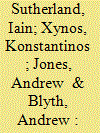| Srl | Item |
| 1 |
ID:
192802


|
|
|
|
|
| Summary/Abstract |
Transitioning to an equitable electricity sector requires a deep understanding of a warming climate's impacts on vulnerable populations. A vital climate adaptation measure is deploying air-conditioning (AC), but AC use can increase household energy costs. We evaluate how a warming climate will affect regional energy equity by tying temperature projections with household temperature response functions derived from smart-meter electricity data in Phoenix, Arizona. We simulate future consumption changes under two climate change scenarios from 2020 to 2070, with and without AC efficiency upgrades.
|
|
|
|
|
|
|
|
|
|
|
|
|
|
|
|
| 2 |
ID:
073150


|
|
|
|
|
| Publication |
Cambridge, Polity, 2006.
|
| Description |
258p.
|
| Standard Number |
0745634419
|
|
|
|
|
|
|
|
|
|
|
|
Copies: C:1/I:0,R:0,Q:0
Circulation
| Accession# | Call# | Current Location | Status | Policy | Location |
| 051505 | 337.03/JON 051505 | Main | On Shelf | General | |
|
|
|
|
| 3 |
ID:
140948


|
|
|
|
|
| Summary/Abstract |
Considerable scholarly effort has been invested in interpreting the existing international legal instruments and diplomatic conventions that apply to kinetic warfare in relation to the field of cyber-warfare. The Tallinn Manual and other documents argue that current humanitarian laws are applicable in cyber-conflict. This includes the concept that particular religious and medical entities should be granted special, protected status along with sites of cultural and religious significance and those containing ‘dangerous forces’. In a kinetic-warfare environment, these sites and non-combatants are identifiable by the use of international symbols such as the Red Cross, Red Crystal and Red Crescent emblems, or other specific signs. Here, Sutherland, Xynos, Jones and Blyth suggest that a simple digital marker could ensure that systems and traffic can be identified as protected in cyber-conflict under the Geneva Conventions.
|
|
|
|
|
|
|
|
|
|
|
|
|
|
|
|